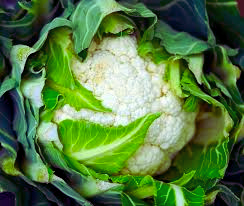Advantages and Disadvantages of Cauliflower and more details.
Advantages of Cauliflower:
1. Nutrient-Rich: Cauliflower is packed with vitamins (C, K, B6) and minerals (potassium, magnesium, folate), which support overall health.
2. Low in Calories: It’s a great option for weight management as it’s low in calories but high in fiber, keeping you full longer.
3. Rich in Antioxidants: Contains antioxidants like glucosinolates and isothiocyanates, which may reduce inflammation and lower the risk of chronic diseases.
4. Supports Digestion: High fiber content promotes gut health and prevents constipation.
5. Versatile in Cooking: Can be used in various dishes, from rice substitutes to pizza crusts, making it a flexible ingredient for low-carb diets.
6. Boosts Immunity: High vitamin C content strengthens the immune system.
7. May Improve Heart Health: Contains compounds that may help reduce blood pressure and cholesterol levels.

Advantages and Disadvantages of Cauliflower and more details.
Disadvantages of Cauliflower:
1. Digestive Issues: High fiber content may cause bloating, gas, or discomfort in some individuals, especially when consumed in large amounts.
2. Thyroid Interference: Contains goitrogens, which may interfere with thyroid function if eaten in excess, particularly in individuals with thyroid issues.
3. Allergic Reactions: Rarely, some people may experience allergies to cauliflower.
4. Pesticide Residue: Non-organic cauliflower may contain pesticide residues, so it’s best to wash thoroughly or opt for organic.
5. Not Suitable for Low-Oxalate Diets: Cauliflower contains oxalates, which may contribute to kidney stones in susceptible individuals.
6. May Cause Hypoglycemia: In rare cases, its low-carb nature might affect blood sugar levels, especially in diabetics on medication.
Conclusion:
Cauliflower is a highly nutritious vegetable with numerous health benefits, but moderation is key, especially for individuals with specific health conditions like thyroid issues or digestive sensitivities.

Advantages and Disadvantages of Cauliflower and more details.
Cauliflower can help reduce belly fat in the following ways:
1. Low Calorie and High Fiber :
Cauliflower is very low in calories and high in fiber. Fiber slows down digestion, making you feel full for a longer time, which reduces overeating and aids in weight loss.
2. Boosts Metabolism :
The vitamin B complex and other nutrients present in cauliflower help improve metabolism, speeding up the calorie-burning process.
3. Low-Carb Alternative :
Cauliflower can be used as a substitute for rice, flour, or even mashed potatoes. This helps reduce carb intake and control calorie consumption.
4. Rich in Antioxidants :
The antioxidants present in cauliflower help reduce inflammation in the body, which can support weight loss and belly fat reduction.
5. Detoxification :
Cauliflower contains compounds called glucosinolates, which aid in liver detoxification. This helps remove toxins from the body and improves the weight loss process.
6. Hydration :
Cauliflower has a high water content, which helps keep the body hydrated and keeps the metabolism active.
Important to Note:
Cauliflower alone cannot reduce belly fat. It must be combined with a balanced diet, regular exercise (such as cardio and strength training), and a healthy lifestyle. Additionally, consuming too much cauliflower can cause gas or bloating, so it should be eaten in moderation.

Advantages and Disadvantages of Cauliflower and more details.
Here are a few recipes you can make with cauliflower
1. Cauliflower Rice-
Ingredients : Cauliflower, olive oil, salt, pepper, optional herbs or spices.
Instructions : Grate or pulse cauliflower in a food processor until it resembles rice grains. Sauté in a pan with olive oil, salt, and pepper for 5-7 minutes. Add herbs or spices as desired.
2. Cauliflower Curry
Ingredients : Cauliflower, onions, tomatoes, garlic, ginger, turmeric, cumin, coriander, chili powder, coconut milk, and cilantro.
Instructions : Sauté onions, garlic, and ginger. Add spices and tomatoes, then cook until soft. Add cauliflower florets and coconut milk. Simmer until cauliflower is tender. Garnish with cilantro.
3. Roasted Cauliflower
Ingredients : Cauliflower, olive oil, salt, pepper, garlic powder, paprika.
Instructions : Toss cauliflower florets with olive oil, salt, pepper, garlic powder, and paprika. Roast in the oven at 400°F (200°C) for 20-25 minutes until golden and crispy.
4. Cauliflower Soup
Ingredients : Cauliflower, onion, garlic, vegetable stock, cream (optional), salt, pepper.
Instructions : Sauté onion and garlic, add cauliflower and stock. Simmer until cauliflower is soft. Blend until smooth, add cream if desired, and season with salt and pepper.
5. Cauliflower Pizza Crust
Ingredients : Cauliflower, egg, cheese, salt, pepper, oregano.
Instructions : Grate cauliflower and steam or microwave it. Squeeze out excess moisture. Mix with egg, cheese, and seasonings. Press into a pizza shape and bake at 400°F (200°C) for 15-20 minutes. Add toppings and bake again.

Advantages and Disadvantages of Cauliflower and more details.
Cauliflower Recipes for pets.
something healthy and tasty can be made from cauliflower for pets, but it depends on what kind of pet (dog or cat) you are preparing it for. Cauliflower contains fiber, vitamins (such as Vitamin C and K), and minerals, which can be beneficial for pets, but it is important to prepare it properly.
Cauliflower Recipe for Dogs:
1. Cauliflower Rice : Cut cauliflower into small pieces and blend or grate it to achieve a rice-like texture. Lightly boil or steam it and mix it with the dog’s regular food.
2. Cauliflower Mash : Boil the cauliflower and mash it, then add a little olive oil or coconut oil and serve it to your dog. You can also mix in boiled chicken or turkey for added protein.
Cauliflower Recipe for Cats:
Cats are naturally carnivorous, so they should only be given cauliflower in small amounts.
1. Cauliflower Mix : Boil the cauliflower, cut it into small pieces, and mix it with the cat’s regular meat.
2. Cauliflower Treats : Bake the cauliflower until crispy and serve it with a little tuna fish.
Things to Keep in Mind:
Quantity : Cauliflower should be a part of the pet’s regular diet, but not in excessive amounts, as it may cause digestive issues.
No Spices : Do not add any spices, salt, onions, or garlic while preparing food for pets.
Consult : If your pet is dealing with any health condition, consult a vet.
Cauliflower can be prepared in a safe and healthy way for pets, but always maintain balance and moderation.
